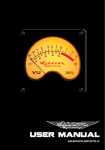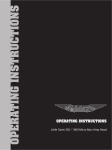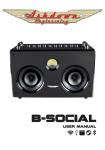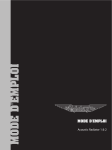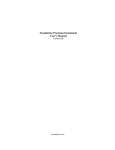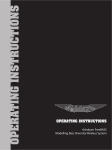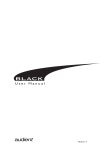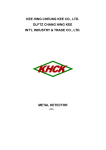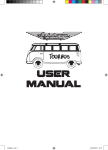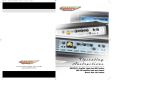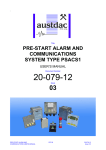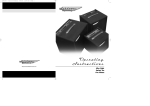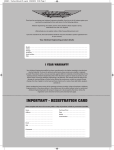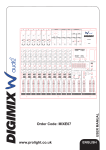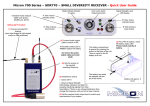Download Manual - Ashdown
Transcript
#22832 - J-lo Pedal Ops 23/11/07 12:38 Page 1 Designed to meet the specific needs of the modern bass player, Ashdown’s Dual Band Compressor splits the signal A unique, bass-specific overdrive Why should guitar players have all the fun? pedal providing a stunning range of Ashdown's Bass Drive Plus pedal generates a wide applies compression separately to both – fast attack distortion effects as envisioned by Megadeth range of bass distortion by splitting the signal and decay for the high frequency and slow attack and decay bassist James LoMenzo. TRUE BYPASS SWITCHING into high and low frequency bands and into High and Low frequency bands and applying appropriate for the low frequency or fundamental waveform of the note. A high-quality chorus, just for bass players. In addition to the standard types of distortion to either one or both. HF and LF distortion The amount of compression applied to each is independently Depth and Speed controls, the Plus part of this pedal can be switched in have their own individual Drive controls with a separate Balance variable and the balance between the high and low frequency to provide flanging and a unique range of delay effects. control to blend the two together. In this way distortion can be components of the signal is also controllable as they are re- Bass Chorus Plus True Bypass Switching Bass Drive Plus added to the HF signal only maintaining a full and fat bottom end. Bass combined into a single, full range output. Dual Band Compression True Bypass Switching True Bypass Switching It’s time to get funky with the Ashdown Envelope Filter. Capable of a wide range of www.ashdownmusic.com This earth-Shattering pedal generates a note effects from auto-wah through to spaced-out, auto- one octave below the note being played, at the same triggered funky tones, the sweep of the filter can be either up or volume and based on the waveform of the original signal. down with selection of band-pass or high pass filter modes. A peak By blending the sub-octave note with the original signal, bass players control is provided to deepen the ‘Q’ for more extreme effects and the can move from a subtle reinforcement of the sound to truckloads of depth of the effect is controlled by the volume of each note as it’s played, bone crushing tone. As a further Plus, distortion can be added to the making this a truly creative and dynamic pedal. sub-octave note, with the level of distorted sub-octave and Bass Envelope Plus True Bypass Switching Bass Sub-Octave Plus Bass Effects Pedals degree of distortion both adjustable by the player. True Bypass Switching www.ashdownmusic.com #22832 - J-lo Pedal Ops 23/11/07 12:38 Page 2 Bass Dual Band Compressor Bass Effects Pedals Operating Instructions All effects pedals in the Ashdown range have been specifically designed for bass. TRUE BYPASS SWITCHING All effects pedals in the Ashdown range use ‘True Bypass Switching’, this means when the effect is bypassed then all electronic components within the pedal are switched out of circuit, the Input jack socket is then connected directly and only to the Output jack socket ensuring no degradation of your bass signal. In most effects pedals the internal circuitry remains connected even when the effect is bypassed. This changes and degrades your bass signal. With ‘True Bypass Switching’ when the effect is bypassed then it is the same as if your bass were plugged directly into the input of your amplifier. All Ashdown effects have an LED that will light to indicate when the effect is active. INPUT & OUTPUT LEVEL CONTROLS All Ashdown effects have Input and Output Level controls. The Input Level control allows the user to adjust the signal level from his bass to allow the effect to work at its optimum. The Signal Level can easily be monitored on the front panel VU Meter. This is necessary as signal levels from different bass guitars can vary over a very wide range especially between Active and Passive instruments. SETTING THE ‘INPUT’ With all Ashdown effects pedals always adjust the ‘Input’ so that the VU meter gives a reading of between –7 and 0dB on the scale all the time you are playing with only occasional peaks into the red section. ADJUSTING THE ‘OUTPUT’ The Output Level control allows the user to adjust a perfect balance between the effect being switched into circuit and the ‘True Bypass’ mode. BATTERY The internal 9v battery is activated when a jack plug is inserted into the Instrument In jack socket. This can be replaced by removing the battery compartment door on the underside of the unit. Always use an Alkaline battery type 6LR61 for maximum life. AC ADAPTER Only ever use the special 9v AC adapter available from Ashdown. This can be plugged into the DC Connector on the back of the unit. Bass Drive Plus The Ashdown Bass Drive Plus is a bass specific distortion unit providing a wide range of distortion effects. This operates in a totally different way to all previous and existing distortion or overdrive effects units. The approach is similar to the Dual Band Compressor in that distortion can be added to either the high frequency content or the low frequency content of the bass signal individually. The thinking behind this is that distortion can be added to only the high frequency content of the bass signal leaving the lower frequencies completely untouched and thus preserving the solid bottom end of the bass sound whilst still providing a very useable distortion. It was found that the degree and type of distortion that works best for bass needs to be different at low frequencies to that for high frequencies. So what we have done is to split the bass signal into two frequency bands and applied not only different degrees of distortion to each band but also different types of distortion character as well. The amount of distortion is individually adjustable for the high frequency and low frequency band. LF DRIVE – HF DRIVE Two separate and different distortion circuits are employed in the Bass Drive Plus effect pedal. One operating on the high frequencies and another on the low frequencies. The LF Drive control adjusts the amount of Drive or distortion added to the low frequency content of the bass guitar signal. The HF Drive control adjusts the amount of Drive or distortion added to the high frequency content of the bass guitar signal. The maximum amount of Drive available on each control is dependent on the setting of the Input control. With this set for optimum signal as described in the SETTING THE ‘INPUT’ section of these instructions the degree of Drive will be what we consider to be optimum for bass. If more distortion is required it is possible to increase the setting of the Input control to provide this. < BALANCE > The < Balance > control provides adjustment of the balance between high and low frequencies within the note for further artistic expression. Set to its centre position i.e. 12 o’clock (with HF & LF Drive set to zero) it provides an equal balance between low and high frequencies. Turning to the right increases the high frequencies and decreases the low frequencies. Turning to the left Increases the low frequencies and decreases the high frequencies. The Balance between high and low frequencies will vary depending on the settings of the HF & LF Drive controls, this Balance control can then be used to restore the HF/LF signal balance. A wide range of Distortion effects are available with this unit. Try adding just HF Drive as explained earlier or just LF Drive or of course mixtures of both. Use the Balance control for fine adjustments to the signal HF/LF balance as these two Drive controls are varied. We are sure there will be a setting ideal for everybody’s tastes. Technical specifications HF Drive filter section Filter frequency 180Hz Filter roll off 12dB/octave LF Drive filter section Filter frequency 600Hz Filter roll off 12dB/octave Composite crossover point of the overlapping High and Low pass filters = 250Hz HF Gain 0 to 60dB LF Gain 0 to 30dB Input Impedance 470k Ohms Signal level –10dBv to 0dBv Output Impedance 10k Ohms Signal level variable –10dBv to 0dBv Supply Internal 9v battery External supply 9v DC adaptor. Centre pin negative. DUAL BAND COMPRESSOR The Ashdown Dual Band Compressor is a special kind of compressor designed specifically for bass. It splits the Bass signal into two frequency bands and applies compression individually to each band. The degree of compression applied to either high or low frequencies is individually adjustable by the user. These two frequency bands are then re-combined into a single Full Range signal with the balance between high and low frequencies adjustable with the ‘EQ Balance’ control. This approach towards Compression is necessary for bass because a Fast Attack is required to catch the initial transient and high frequency content of the bass note whereas a Slow Attack is required for the low frequency or fundamental waveform of the note to ensure the waveform is not distorted. If a Full Range compressor is used for bass then a Fast attack will distort the low frequency waveforms whereas a slow attack would fail to catch the initial transient. This is also true of the Decay/Release portion of the compression, a fairly fast decay is ideal for the high frequencies whereas a slow decay is best for the low frequency content. The Ashdown Dual Band Compressor therefore gives you the best of both with Attack and Decay parameters already set to optimum values for Low and High frequencies plus individual user adjustment of the degree of compression applied to each portion of the note, Low Comp & High Comp. The Ashdown Dual Band Compressor can increase sustain on any note or harmonic, smooth out playing dynamics, add definition to fast runs, provide a switchable volume boost, provide a wide range of EQ’s that are easily and instantly adjustable, provide High or Low compression or any combination of the two and can function in the effects loop or on the front end of any amplification system. LOW COMP, HIGH COMP The degree of compression applied to the low frequency content of the bass signal is set using the Low Comp control. Applying compression only to the low frequencies gives a fat bottom end to the note, it can also smooth out playing dynamics and provide additional sustain. All this without the loss of the transient or attack portion of the note. The degree of compression applied to the high frequency content of the bass signal is set using the High Comp control. This compresses the attack part of the note and can be used to good effect in limiting the transient on pulled or slapped notes and can be used alone or in combination with the Low Comp control. Try to use both these controls in moderation as this will produce the most pleasing effect. EQ BALANCE The EQ Balance control provides adjustment of the balance between high and low frequencies within the note for further artistic expression. Set to its centre position i.e. 12 o’clock it provides an equal balance between low and high frequencies. Turning to the right increases the high frequencies and decreases the Low frequencies. Turning to the left Increases the low frequencies and decreases the high frequencies. This in fact this gives further uses for this effects pedal where Low & High Compression can both be set to zero and just the EQ Balance control be used to set a different EQ that can be switched In or Out. Bass Sub-Octave Plus The Ashdown Sub Octave Plus generates a note one octave below that of the bass guitar note at its Input. This Sub Octave note is based on the waveform of the bass signal and its level will also follow that of the original bass guitar signal. The lower octave note generated can be mixed with the original bass note using the Sub Level control. As a further Plus, Distortion can also be added to the Sub Octave note with the degree of distortion and the level of the distortion both being adjustable by the user, providing an entirely new range of effects available to the modern bass player. SUB LEVEL The Sub Level control sets the level of volume of the clean sub octave note produced by the Sub Octave Plus pedal. This can therefore be balanced against the original bass guitar signal. DIST DRIVE Technical specifications High pass filter section Filter frequency 225Hz Filter roll off 12dB/octave Low pass filter section Filter frequency 900Hz Filter roll off 12dB/octave Composite crossover point of the overlapping High and Low pass filters = 350Hz High compression Attack time 1mS Decay time 70mS Max comp ratio 8:1 Low compression Attack time 22mS Decay time 122mS Max comp ratio 8:1 Input Impedance 470k Ohms Signal level –10dBv to 0dBv Output Impedance 10k Ohms Signal level variable –10dBv to 0dBv Supply Internal 9v battery External supply 9v DC adaptor. Centre pin negative. The range of controls on the Sub Octave Plus effect provides not only the one octave below sound that most octave pedals produce but also a whole range of new sounds available from the addition of sub octave distortion that can be mixed in with both the clean sub octave as well as the original bass guitar sound with infinite variations of the balance between all 3 sounds. The Ashdown Bass Chorus Plus is a bass specific unit providing a wide range of Chorus, Flanging and Resonant Filter effects. Most Chorus units have Speed and Depth controls and with these it is always necessary to reduce the Depth as the Speed is increased otherwise the resultant sound becomes unusable because the notes pitch is over modulated. With the Bass Chorus Plus we have combined the adjustment of Speed and Depth into one control that automatically decreases the Depth as the Speed is increased. To give some degree of pitch modulation adjustment we have introduced a ‘Range’ control. An Envelope Filter effect is simply a variable Band Pass or Low Pass electronic filter circuit where the ‘sweep’ through its filter range is controlled by the level of signal passing through the unit. In other words the device is dynamically controlled by the player i.e. the harder the note is played the greater the frequency range through which the sweep of the filter passes. This Sweep can usually be chosen to be in an Upward direction i.e. the filter frequency increases with an increase in signal level or in a Downward direction i.e. the filter starts at a high frequency and sweeps downward with the degree of sweep following the signal level. It is important to set the Input level to the correct reading on the VU meter as this will affect the range and sensitivity of the envelope filter. PEAK The Peak control adjusts the sharpness of the Peak or ‘Q’ of the filter response. Increasing the setting of this control gives a much more emphasised range of filter harmonics in the instruments tone. Use the low range for more natural sounding filter sweeps and the higher settings for more exaggerated filter effects. UP/DOWN The Up/Down control determines if the sweep through the filters frequency range is in an Up direction i.e. the frequency of the filter increases as the note is played harder, or in a Down direction i.e. the filter starts at a high frequency and sweeps downward as the note is played harder. In most Envelope Filter pedals this is a switched selection i.e. you can choose either Up or Down. What we have done is to provide you with a variable degree of both the Up and Down ranges on a single rotary control with fully Up at one end of the control and fully Down at the other. With the control in its centre position there is no sweep effect at all, this is zero setting for both Up and Down. Turning the control clockwise from its centre position gradually increases the Down sweeping range whilst turning anticlockwise from its centre position gradually increases the Up sweeping range. It is therefore possible to precisely adjust the BP/LP stands for Band Pass or Low Pass filter frequency responses, Band Pass is like a Wah-Wah where a narrow band of frequencies is swept through with the filter rejecting all frequencies either side of this pass band. Low Pass is like a very powerful Treble control i.e. when turned down you hear only the low frequencies and as the frequency range is swept upward the mid and then the high frequencies are added to the low frequencies. In a way Low Pass is more useful for bass as the low frequencies are always retained within the sound, however Band Pass is a more exaggerated effect but makes the sound too thin at the high frequency end of the range. Usually an Envelope Filter will offer you a switched choice of either Band Pass or Low Pass but what we discovered was that mixing the two together provided a much more useful sound than either one alone. We have therefore made the BP/LP control work in a similar way to the Up/Down rotary control i.e. one end of the control is fully Band Pass and the other end of the control is fully Low Pass, thus anywhere in-between is a mixture of the two, with the centre position being equal proportions of Band Pass and Low Pass. Technical specifications Filter Range 30Hz to 12kHz Filter roll off 24dB/octave Filter Peak Q Infinitely variable from 3 to 10 BP/LP Single rotary control selects BP, LP or a continuously variable mix of both Up/Down Up & Down ranges continuously variable from zero to full sweep Input Impedance 470k Ohms Signal level –10dBv to 0dBv Output Impedance 10k Ohms Signal level variable –10dBv to 0dBv Supply Internal 9v battery External supply 9v DC adaptor. Centre pin negative. The FREQ control adjusts the band of mid frequencies that are to be subjected to the distortion effect. The range can be swept from 200Hz to 2.2kHz. The FREQ control also works in conjunction with the ‘Q’ switch. With the ‘Q’ switch in its down position the bandwidth of the variable frequency control is set to 1 octave. With the ‘Q’ switch in its up position the bandwidth is half octave which gives a more peaked and focused effect. The level of the distorted sub octave signal can be balanced against the clean sub octave and the original bass guitar signal using the Dist Level control. The Ashdown Envelope Filter is a bass specific unit providing a wide range of automatic filter opening and closing or ‘sweeping’ effects. Although the controls perform similar functions to other Envelope Filter effects you will find that a much wider range of effects are available from this unit than from most Envelope Filter effects pedals. More of the reasons for this below. With our unique Chorus/Flange rotary control you can morph from Chorus into Flanging providing ultimate control over the specific degree of flanging introduced into the Chorus effect. The automatic ‘sweep’ of the filter effect can also be disabled with the ‘Filter’ switch. In this mode the ‘Speed’ control provides a means to manually sweep through the filter range providing a spectrum of resonant filter effects. It is important to set the Input level to the correct reading on the VU meter as this will ensure the unit is working at its optimum. SPEED The Speed control adjusts the rate of the automatic sweep back and forth through the filter range for both Chorus and Flanging. There is no actual Depth control on the Bass Chorus Plus because we have combined the functions of Speed and Depth into one control that automatically decreases the Depth as the Speed is increased. The reason for this is that as the Speed of the filter sweep is increased, it is always necessary to reduce the Depth of the effect to prevent excessive pitch modulation destroying the actual pitch of the note. This approach saves time in selecting different Speed settings as it is only necessary to adjust one control. We have however retained some degree of pitch modulation adjustment by providing a Range control that does not need readjusting each time the Speed is altered. In Filter mode the Speed control provides a means to manually sweep through the range of Resonant Comb Filter effects available. RANGE The RANGE control provides fine adjustment over the degree of pitch modulation introduced to either the Chorus or Flange effects. This has a greater degree of control over the flanging effects because the harmonics within the note are considerably more The LoMenzo Hyper Drive is a bass specific distortion unit providing a unique range of distortion effects as envisioned by James LoMenzo, bassist for Megadeth. The operation of this distortion pedal is totally unique and unlike any previous and existing distortion or overdrive effects units. A band of frequencies within the Mid range of the bass signal is filtered out and the distortion effect is added only to this band of frequencies. The filtered frequencies can be ‘tuned’ to the precise range that gives the optimum effect. The degree of distortion available is variable from a slight effect only to well over the top, allowing for a new range of extreme effects for bass to be produced. The resultant distortion effect can be mixed in with the original ‘Dry’ bass signal maintaining a full bodied powerful bass character with distortion overtones. FREQ CONTROL & ‘Q’ SWITCH DIST LEVEL Bass Chorus Plus BP/LP Sub Octave Pitch - 1 octave below root note Waveform - Sampled from original note Envelope - Follows original volume envelope Sub Bandwidth – 10 to 160Hz Distortion Drive Gain 0 to 30dB Input Impedance 470k Ohms Signal level –10dBv to 0dBv Output Impedance 10k Ohms Signal level variable –10dBv to 0dBv Supply Internal 9v battery External supply 9v DC adaptor. Centre pin negative. Distortion can be added to the sub octave not generated and the Dist Drive control is used to adjust the degree of Drive or Distortion that is added to the original sub octave signal. Bass Envelope Filter degree of either the Up or Down frequency sweep exactly to your liking. Technical specifications Technical specifications Freq control filter section Filter type – State variable band Pass Filter frequency tunable range 200Hz to 2.2kHz Bandwidth selectable with ‘Q’ switch – 1 octave or 1/2 octave Drive control 0 to 60dB Mix control Infinite Mix between Dry bass signal and Effected signal Input Impedance 470k Ohms Signal level –10dBv to 0dBv Output Impedance 10k Ohms Signal level variable –10dBv to 0dBv Supply Internal 9v battery External supply 9v DC adaptor. Centre pin negative. DRIVE & +10dB SWITCH The DRIVE control adjusts the degree of distortion added to the mid frequency band selected above. The range of this control is very wide going from almost no distortion on minimum (this is also dependent on the setting of the INPUT control) to well over the top on maximum. The +10dB switch works in conjunction with this control giving a minimum of +10dB boost to any setting of the DRIVE control providing extreme distortion effects with long sustain. emphasised than in chorusing. This control also has some effect in Filter mode. CHORUS/FLANGE With this control in its fully anti-clockwise position all effects are Chorus only. As the control is advanced Flanging is introduce to the Chorus effect until at its fully clockwise or maximum setting full Flanging is achieved. This Chorus/Flange control provides a range of effects between Chorus and Flanging that are very useable and infinitely variable. FILTER SWITCH The Filter switch disables the automatic ‘sweep’ through the filter range in both Chorus and Flange. Once the automatic sweep has been disabled the Speed control can be used to manually adjust the setting of the now static filter range providing a host of resonant comb filter effects. The Range control also provides further fine tuning to this adjustment. The most prominent resonant filter effects are achieved with the Chorus/Flange control set at maximum i.e. full Flange. Technical specifications Delay Filter Range 60Hz to 12kHz Filter Peak Comb Filter with very high Q resonant peaks Frequency sweep speed 0.2Hz to 8Hz Chorus/Flange Continuously variable from Chorus to full Flange Input Impedance 470k Ohms Signal level –10dBv to 0dBv Output Impedance 10k Ohms Signal level variable –10dBv to 0dBv Supply Internal 9v battery External supply 9v DC adaptor. Centre pin negative. www.ashdownmusic.com


